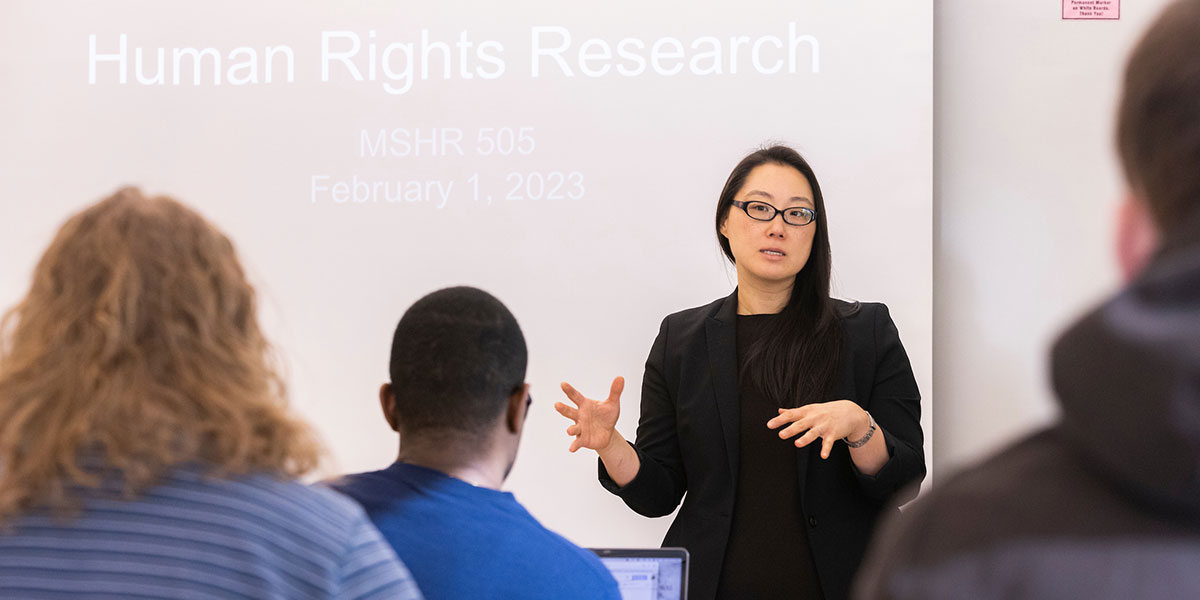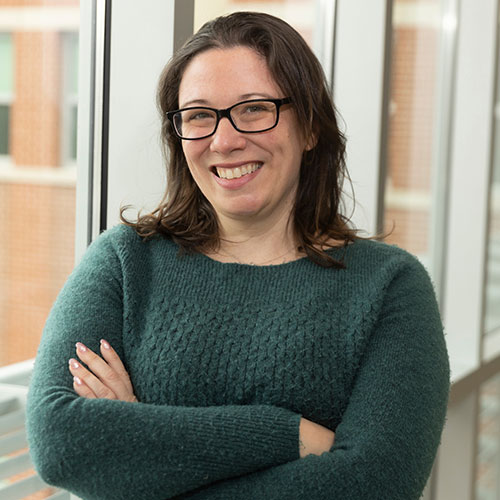Human rights program prepares students to empower communities
CCPA's Master of Science in Human Rights program trains students to build impactful social justice movements

When people think about human rights, they might focus on international organizations and institutions like Amnesty International or the United Nations, high-profile legal cases and celebrity spokespeople. But in the College of Community and Public Affairs’ Master of Science in Human Rights program, students are trained to build impactful social justice movements that begin with the communities where they live.
If all it took to guarantee human rights was good intentions by elites, then we would live in a very different world,” says Suzy Lee, assistant professor and program director. “For human rights to be safeguarded and secure, we need to organize communities and embolden them with knowledge and tools to demand those rights for themselves.”
Launched in fall 2019, the Master of Science (MS) in Human Rights program uses an interdisciplinary approach to prepare students to contend with real-world issues while empowering the communities they serve.
The program has 19 graduates from two cohorts. Some came directly from undergraduate programs like CCPA’s Bachelor of Science in Human Development and other Binghamton University majors, including anthropology, political science, sociology and English. As the program becomes established, however, it is seeing an increase in applicants from other universities, both in and out of state and internationally.
“We have a fairly diverse group of applicants,” Lee says, “with some having spent significant time in the workforce. We’ve had adult students interested in career changes, and in our first cohort we had a student in his 70s who decided to earn a degree in retirement. And we have traditional students arriving from a diversity of undergraduate programs.”
New Jersey native Elizabeth Rodrigues, currently in her second year of the program, earned an undergraduate degree in technical theatre from Emerson College in 2003.
“I never considered going to graduate school,” she says. “But when COVID hit, I had a lot of time to think about my future and what I was going to do when my kids graduated. I’ve always been interested in women’s rights, even as a child, and dreamed about working at an organization like Planned Parenthood. I saw this program as an opportunity to level up my skills and knowledge.”
Program faculty also hail from a variety of specializations. Lee is a sociologist with a Harvard law degree, but clinical psychology, education, cultural studies and anthropology also figure into the human rights program’s interdisciplinary approach.
“We have an eclectic mix of faculty who are working on similar questions, but from very different angles,” Lee says. “So, our students get a good mix of perspectives.”
From classroom to community
While there is a robust theoretical component to the program, theory is never detached from practical application. Even in the classroom, students are challenged with understanding how human rights theories play out in the real world.
“The program has really changed how I think,” Rodrigues says. “It’s taught me to examine things we take for granted, question my own biases and, like a good sociologist, see past the dominant narratives.”
Experiential opportunities, specifically a 120-hour semester-long internship in the second year, provide students with practical application. Several local nonprofit organizations offer intern placements; however, students can also opt for positions at state, national and international agencies.
As part of the internship, students work closely with faculty to help them process the experience and connect it with classroom work.
Department of Human Development Community Liaison Megan McCabe directs the internship appointments.
“We have several local community-based organizations that we work with, such as the Broome County Council of Churches’ CHOW program,” McCabe says. “Internships vary and can relate to the student’s area of interest, capstone project or thesis, and they all have a social justice or human rights focus.”
“We also try to prepare students for some of the less glamorous aspects of social justice and human rights-oriented work in our professionalism course,” Lee says. “We want students to understand that sometimes the job requires simply completing everyday administrative duties. We also do our best to equip our students to manage the emotional toll that often accompanies this kind of work.”
Putting timely issues into focus
Students frequently take on challenging subjects, such as domestic violence, through their wide range of capstone projects. Their goal is to seek opportunities for constructive solutions.
One recent project involved a student-led collaboration of organizations that work with victims of domestic violence and a team of coders and videographers who developed an app that provides resources for women escaping abusive relationships. Lee says the app is proving especially useful for connecting victims to avenues for help when the abuser is keeping tabs on communication outlets.
“One of the most dangerous times for victims of domestic violence is when they are trying to leave an abusive relationship,” Lee says. “It’s a clever solution that serves a need and demonstrates vision and effective project management within the human rights and social justice fields.”
Other notable projects include a student-authored podcast about COVID and its impact on educational equity in Broome County, N.Y., and an analysis of FEMA and the agency’s response to civil claims in the aftermath of the devastating flooding that occurred locally in 2011 from Tropical Storm Lee.
Student thesis-related research has also led to publication in peer-reviewed journals, including a project about missing and murdered indigenous women in the United States published in the Journal of Forensic Science.
Rodrigues’ capstone project, a series of monologues based on personal stories around abortion that she will perform in her final semester, is directly related to her future ambition.
“I want to destigmatize abortion by humanizing the issues and showing the breadth of reasons why someone might make that choice,” she says.
Program graduates count on a range of employment opportunities, whether locally with agencies based in Broome County, or internationally for organizations such as the International Red Cross in Geneva, Switzerland.
Create transformative change
Given its success, the new program is interested in expanding. In fall 2023, the department will begin offering a post-baccalaureate certificate in human rights. The 16-credit program is geared toward professionals who want to gain advanced competencies in human rights approaches.
“We see the certificate program enabling community outreach and engagement,” McCabe says. “We are sending our students into the community to learn from professionals working on social justice issues, and we want to bring some of those professionals back into the classroom. In this way, we further engage with and invest in our local community.”
According to Lee, one of the most important skills the current program teaches students is community building — empowering communities with the tools to articulate needs and have those needs respected and responded to.
The emphasis on creating change movements at the grassroots level is not just an enlightened or moral tactic; it is pragmatic. Change, according to Lee, is legitimized and lasting when the impetus and energy stem from the community itself. And this philosophy drives the human rights program.
“While we train our students to be confident in the halls of power, that isn’t our focus,” Lee says. “We are preparing our students to galvanize communities and create transformative change at its root.”

